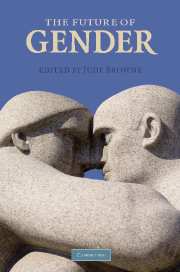Book contents
- Frontmatter
- Contents
- List of figures
- List of tables
- List of contributors
- Acknowledgements
- Introduction
- Part I Reorienting the feminist imagination
- 1 Mapping the feminist imagination: from redistribution to recognition to representation
- 2 Perspectives on gender equality: challenging the terms of debate
- 3 When will society be gender just?
- Part II Variations on the theme of gender
- Part III Gender and political practice
- Index
- References
2 - Perspectives on gender equality: challenging the terms of debate
Published online by Cambridge University Press: 05 June 2012
- Frontmatter
- Contents
- List of figures
- List of tables
- List of contributors
- Acknowledgements
- Introduction
- Part I Reorienting the feminist imagination
- 1 Mapping the feminist imagination: from redistribution to recognition to representation
- 2 Perspectives on gender equality: challenging the terms of debate
- 3 When will society be gender just?
- Part II Variations on the theme of gender
- Part III Gender and political practice
- Index
- References
Summary
Today in the west, it is not only self-proclaimed feminists who say that women should have the same right as men to vote, enter politics, go to university, work outside the home or receive equal pay when they do equal work. This kind of equality is now part of the ‘common sense’ of our society. These equal rights were, however, not won easily, and they have still not been won in many parts of the world.
Early feminist campaigns for equal rights used a range of arguments, many of which can still be heard today. Some feminists accepted and adapted traditional ideas about women's ‘difference’ from men to argue that women needed political rights and legal protection in order that their needs as wives and mothers could be met, and/or so that their alleged qualities, such as peace-making and temperance, could raise the quality of public life. Some saw sex equality as a consequence and/or precondition for a more generally equal socialist society, in which human relationships would be free from ownership and control. Many others used the language of liberal democracy to demand rights on the grounds that women were in relevant respects the same as men, and that as rational individuals they should have the same rights and opportunities (for overviews of early feminism, see Evans 1977; Banks 1986; Bryson 2003).
- Type
- Chapter
- Information
- The Future of Gender , pp. 35 - 53Publisher: Cambridge University PressPrint publication year: 2007
References
- 2
- Cited by

